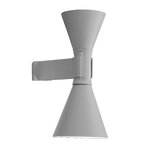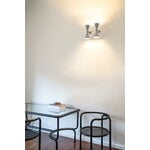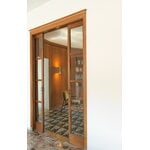Nemo Lighting's Applique de Marseille Mini is a smaller version of the classic lighting design from 1952. The French designer Le Corbusier, a pioneer of functional and modern design, designed the original Applique de Marseille wall lamp for his own apartment in Paris. The lamp consists of two cone-shaped aluminum shades that direct the light both up and down, creating clear and beautiful light beams that highlight the interior in an interesting way. The small Applique de Marseille Mini is ideal for a reading light in the bedroom, a spotlight in the living room or to illuminate the hallway.



Applique de Marseille Mini wall lamp, grey
Nemo Lighting
Description
Nemo Lighting's Applique de Marseille Mini is a smaller version of the classic lighting design from 1952. The French designer Le Corbusier, a pioneer of functional and modern design, designed the original Applique de Marseille wall lamp for his own apartment in Paris. The lamp consists of two cone-shaped aluminum shades that direct the light both up and down, creating clear and beautiful light beams that highlight the interior in an interesting way. The small Applique de Marseille Mini is ideal for a reading light in the bedroom, a spotlight in the living room or to illuminate the hallway.
Product details (15)
- Material
- Aluminum
- Colour
- Gray
- Width
- 4.72 in (12 cm)
- Depth
- 7.72 in (19.6 cm)
- Diameter
- 4.72 in (12 cm)
- Height
- 10.63 in (27 cm)
- Bulb base
- E14
- Light source
- 2 x 4W (not included)
- IP rating
- 20
- Protection class
- II
- Voltage
- 230 V
- Nominal frequency
- 50 Hz
- Certifications and labels
- CE, EAC
- Hardwired wall mount
- Yes
- Dimmable
- No, but can be fitted with an aligned dimmer. In this case, please use a dimmable light bulb.
- Product ID
Designer
Charles-Édouard Jeanneret-Gris (1887-1965) was a Swiss architect, artist, designer, urban planner and writer, best known for his achievements in modern architecture. He adopted the name Le Corbusier, a pseudonym of his grandmother’s last name Lecorbésier, in 1920 in the first issue of the L’Esprit Nouveau journal.
Le Corbusier started his studies at the La Chaux-de-Fonds art school at the age of thirteen and soon shifted from watchmaking to painting and architecture. He designed his first house in 1905, made several study trips to Europe and worked for a number of architects such as Auguste Perret and Peter Behrens. During World War I Le Corbusier taught in his alma mater and moved later to Paris.
His most important architectural pieces include Villa Savoye in Poissy (1929-1931), Unité d’Habitation in Marseille (1947-1952), the city of Chandigarh in India (1954) and Notre Dame du Haut in Ronchamp (1955). In furniture design Le Corbusier’s LC4 chaise longue and LC2 armchair and sofa are true icons.
Would you like to read more about Le Corbusier and his work? Discover our books:
Le Corbusier, Le Corbusier Le Grand, Guido Guidi: Le Corbusier, 5 Architectures, The Design Book, Atlas of Mid-Century Modern Houses
Reviews (0)
Sustainability
This product does not yet have a sustainability rating.
Learn more.







